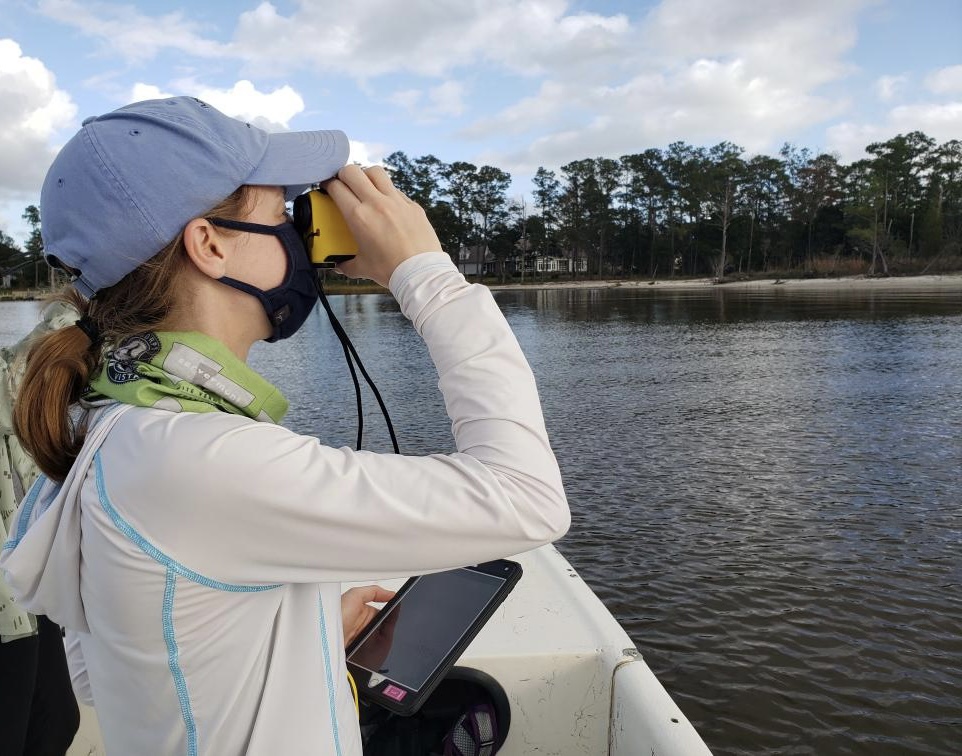Accepting Applications: NC Graduate Fellowship Uses Satellite, Remote-Sensing Technology and Data

North Carolina’s Space Grant and Sea Grant programs are currently accepting applications for Graduate Research Fellowships for the 2023-24 academic year. Two fellowships of up to $10,000 may be awarded to students whose projects address a priority research need within the state’s nearshore environments, coastal areas, watersheds or human activities in these areas.
Applications are due by 5 p.m. ET on March 31, 2023. The successful applicant(s) will be notified around May 15, 2023.
The fellows must use data and technology available through the National Aeronautics and Space Agency (NASA) and the National Oceanic and Atmospheric Administration (NOAA). Research must relate to both the NC Space Grant and NC Sea Grant’s strategic plans.
This joint fellowship is available to full-time graduate students enrolled in an accredited university in the State of North Carolina who are in good academic standing and conducting faculty-mentored research. Applicants must be U.S. citizens.
“NC Space Grant is excited to read the research proposals about students’ plans to take advantage of the vast resources available such as NASA and NOAA instruments, technology and data sources,” notes Sandra Canfield, NC Space Grant assistant director.
Applications are strongly encouraged from graduate students attending historically black colleges and universities and minority serving institutions, and from traditionally underserved and underrepresented communities. In addition, graduate students who can demonstrate how their work and related outreach will benefit underserved and underrepresented communities are encouraged to apply.
The research must start after June 1, 2023, and be completed by May 31, 2024. Fellows will have the opportunity to present their research findings at a meeting or conference among peer researchers and other audiences, such as the annual NC Space Symposium, hosted by NC Space Grant, and NC Sea Grant’s NC Coastal Conference. In addition, fellows will engage in public outreach regarding their research findings.
Information Session Recording
Information Sessions
Graduate students may attend a free virtual information session for additional explanation about the application process. Registration is required, and students or faculty or staff interested in having students apply may register for the information sessions up until the event starts. The sessions will take place at the following dates and times:
- NC Space Grant Student Funding Opportunities Virtual Information Session #1
- Friday, Jan 27, 2023 12:00 PM ET – 1:00PM ET
- Registration Link: https://ncsu.zoom.us/meeting/register/tJArcuCqrTMrHNxhI3go1Axc-62Ul38teLW6
- NC Space Grant Student Funding Opportunities Virtual Information Session #2
- Friday, Feb 3, 2023 11:30 AM ET – 12:30PM ET
- Registration Link: https://ncsu.zoom.us/meeting/register/tJIof-ysqD4qEtAZX1MpwiFYCQDU3dAuffux
- NC Space Grant Student Funding Opportunities Virtual Information Session #3
- Monday, Feb 20, 2023 12:00 PM ET – 1:00PM ET
- Registration Link: https://ncsu.zoom.us/meeting/register/tJMtfu2vqTosGNOHOqOIrDC-gxuzPwZfwbvL
For more information, contact Sandy Canfield, NC Space Grant assistant director, at srcanfie@ncsu.edu.
Spotlight on Recent NC Space Grant – NC Sea Grant Fellows
Allie Best, 2022-23 Fellow
Allie Best, a master’s student at the University of North Carolina at Wilmington, is studying the habitats of the wintering swamp sparrow. Best’s research will model sea level rise and the future availability of this species habitat. These models will help inform conservation efforts and management strategies.
Nick Corak, 2022-23 Fellow
Nick Corak, a doctoral student at Wake Forest University, is using satellite remote sensing and on-site measurements of vegetation before and after prescribed fires in coastal areas to better understand the environmental benefits of prescribed fires.
Maya Hoon, 2021-22 Fellow
University of North Carolina at Chapel Hill master’s alum Maya Hoon studied heavy metals and environmental factors and their associations with antibiotic resistance in the Neuse River Basin. Exposure to heavy metals can induce the development of genes that protect against heavy metals in microorganisms. These genes co-occur with antibiotic resistance, which can potentially cause resistance to medicine humans use. Environmental factors can also influence antibiotic resistance, especially temperature. Hoon’s research involved laboratory processes and the analysis of NASA satellite data to understand where and how microbes in the basin develop resistance.
Jessica Richter, 2021-22 Fellow
East Carolina University master’s alum Jessica Richter used remotely sensed data sources to generate maps that capture estuarine shoreline erosion of the Neuse River Estuary. Richter’s research consisted of advanced processes that provide planners with a better understanding of storm-induced erosion and assist with mitigation and restoration strategies.
Shannon Ricci, 2020-21 Fellow
NC State University doctoral alum Shannon Ricci used remote sensing technology and satellite images to study visitation and usage patterns of artificial reefs managed by the North Carolina Division of Marine Fisheries. Ricci’s research will aid the state agency in assessing the economic impact of the artificial reefs and success of the artificial reef program.
Melinda Martinez, 2019-20 Fellow
NC State University doctoral alum Melinda Martinez used remote sensing data and on-site observations to understand the impacts of ghost forests. Martinez’s research revealed that dead trees contained high quantities of greenhouse gas emissions. Further research assessing specific amounts of greenhouse gasses will create an understanding of how much greenhouse gasses ghost forests emit and absorb.
Emily Ury, 2019-20 Fellow
Duke University doctoral alum Emily Ury used satellite data to analyze vegetation change such as the emergence of ghost forests to understand sea level rise and saltwater intrusion patterns. Ury created a time series to represent the decline of forests. This research can inform future experiments to prevent damage or restore forests.
☽
- Categories:


